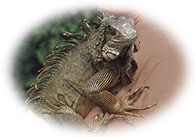Know your reptile pet's NATURAL environment and diet. Your library and pet store should be able to help you research the natural history of the species you keep.
Create a captive environment that is not only beautiful, but easy to clean. Plants in pots (for example) are much easier to manage than a rooted terrarium.
Use a DOUBLE SET of substrate material, OR use disposable substrates to facilitate weekly cleaning. A double set of pebbles or small stones means that one set can be washed and disinfected carefully, dried and stored ready for the next cleaning. Branches, logs, and huts should also be doubled to allow time for proper cleaning (if not disposable).
Use a substrate that will not be accidentally swallowed during feeding or exploration. Small items can cause obstructions if they stick to food and are swallowed.
Provide heat in a sensible form. Climbing reptiles will not get much benefit from an undertank heater, especially if the bedding insulates well. Do not use "white" lights for heat, as they should not be left on at night. The reptile will need heat at night as well. Hot "rocks" are not helpful for hiding species like leopard geckoes – they are not comfortable lying in an exposed position.
Use at least two thermometers in different areas of you enclosure to determine the ambient temperature. Block part of a screen top if you need to retain more heat or humidity.
Many tropical species will need high humidity levels. A shallow bathing dish over or under a heat source will help. Mist such species frequently. Change water in dishes every day.
Use full spectrum fluorescent lighting for most reptile species.
Use an appropriate dietary supplement if your pet is not eating the same diet it would encounter in the wild. Some reptiles need extra calcium or vitamins to help balance the captive diet.
Find a good reptile veterinarian and try and join the local herpetology club. Your local zoo can often direct you to such individuals. Subscribe to a good lay publication such as "Reptiles"* for additional information. *Fancy Publications.





















